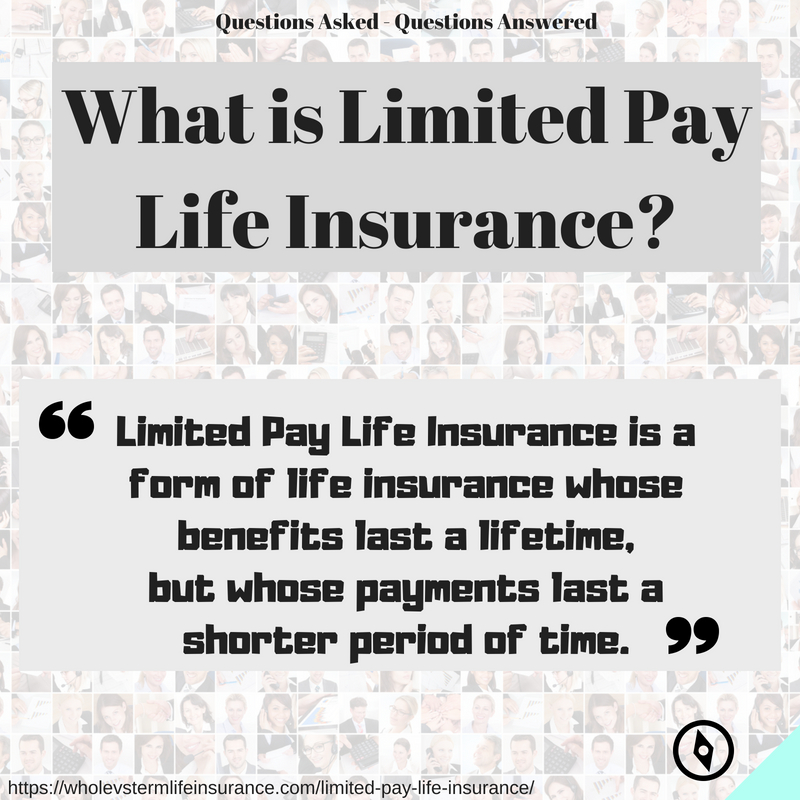Limited Pay Life Insurance
Limited pay life insurance is a form of permanent insurance with yearly payments less than your entire life.
What is a Limited Pay Life Insurance Policy?
Limited pay life insurance is type of life insurance whose benefits are intended to last forever, but whose yearly premiums do not last forever. This is in contrast to Term Life Insurance whose premiums and death benefit amount both are of a limited period of time. Confused? Although the forms of life insurance: Limited Pay Life Insurance and Term Life Insurance are similar, in reality, they are vastly different.
see below for more about what is limited pay life insurance vs what is term life insurance:
Limited Pay vs Term Life
Limited Pay Life Insurance
Term Life Insurance
An Example of this may be a client that is deciding between a ten pay whole life policy that is $16,000 per year for a death benefit of $500,000 and a competing term life insurance policy. For the ten pay policy - They need only make ten full annual payments within ten years to fully pay off for the $500,000 death benefit, which will last for the rest of their life.
Limited Pay Whole Life = Higher Cost, Longer Benefit Time Period.
That same client could also choose a $500,000 30 term life insurance policy for $700 per year. They would make 30 annual payments of $700 per year and at the end of those thirty years that guaranteed term life rate would end. Assuming the client does not choose to extend their term life policy, the coverage would lapse after the 30th year. Then the client would have no coverage.
Term Life = Lower Cost, Shorter Benefit Time Period.
* the term forever is somewhat general in nature and used to simplify the explanation.
WholeVsTermLifeInsurance.com
Of special note here is that in order to effectively explain limited whole life and term life insurance some liberties must be taken with generalizing conditions here. It is possible for a term life insurance policy death benefit to be changed to last forever. It is also possible that a limited pay whole life insurance plan does not last forever. However, to avoid using the term 'generally' or 'usually' to qualify each and every statement and hence confuse many consumers - I have decided to 'generalize' this article. This is often not the case with this blog often. The focus for this article remains to simplify and explain a dark and confusing corner of life insurance for typical Americans.
Limited Pay Life Insurance Definition:
The exact definition of Limited Pay Life Insurance is a bit debatable. Therefore we share with you our definition of it: Limited Pay Life Insurance is a form of life insurance whose benefits last a lifetime, but whose payments last a shorter period of time. That payment period of time can be one of several choices listed below. Limited pay policies include primarily whole life insurance, but may also include universal.

Limited Pay Whole Life Insurance:
The two most popular types of limited pay insurance are limited whole life and limited universal life. Both with varying policy payment periods. A limited pay whole life plan will be a policy whose yearly premiums last for a given period of years, but whose death benefit should last for the remainder of your life.
Limited pay whole life plans deserve a consideration from anyone that is committed to purchasing a whole life policy. Comparing and Contrasting the benefits and costs vs the more traditional whole life policy though can be complex.
Limited Pay Universal Life Insurance:
Limited pay universal life insurance policies are actually much different and more confusing. Universal life insurance in almost always more confusing than either whole or term insurance. So much so that some insurance agents specialize in only this type of insurance. Limited Pay Universal Life insurance policies are policies whose yearly premiums last for the policy payment period and whose death benefit may be sufficient to last your entire life. Universal life insurance is by its very nature, flexible. That flexibility comes at a cost and that cost is the ability of the policy to guarantee much.
For many that are considering a limited pay policy - a limited pay GUL may be what you are offered, however it may not be what you want. At least once you understand it. Universal life policies are historically notorious for not living up to their expectations.
Enter your text here...
Limited Pay Life Insurance Policy - Payment Lengths:
Now that the two different chassis of life insurance have been discussed (whole and universal) its time to discuss the possible policy payment lengths available. Remember the death benefit amount is forever, but the payment period is not.
The most popular limited pay policy option used to be the Single Pay Whole Life Insurance Plan. Under this plan a consumer could opt to purchase one simple policy with just one payment. One and Done. These types of policies had much appeal as it completely alleviated the need for ongoing budgetary considerations. If you could afford the first payment you were done. Then the IRS stepped in and changed the tax laws. These new tax laws made these policies much less desired.
Currently the most popular option is probably the Ten Pay Whole Life Policy - which has death benefit that lasts forever, yet only ten annual payments. Those annual payments are made in the first ten years. This policy limits having to make payments for very long, while at the same time, easily fitting within the IRS tax rules. This ten pay plan is a good solid choice if you really want a whole life policy.
There are of course, more options than just those two. There are Twenty Year Limited Pay Whole Life policies whereby the death benefit if forever, but only 20 annual payments need be made. The 20 pay option is an interesting choice and worth consideration.
There is also a Fifteen Year Limited Pay Whole Life option. This policy guarantees the benefit forever and yet only has payments for 15 years. This option is not all that widespread and in my experience not that many insurance companies offer this.
In addition I have seen a Thirty Pay Whole Life Insurance policies that require 30 annual payments. The 30 pay though - I must question the logic for people choosing them, as the typical whole life insurance policy after being paid for thirty years typically already begins to have some fringe benefits. The differences between a typical whole life and a 30 year pay would be much more minor.
Another seldom discussed option is the Limited Seven Pay Whole Life policy, which for IRS tax reasons is the exact amount of years that a policy must be set up for to garner some tax advantages. The seven pay, in my opinion, is extremely similar to the ten pay policy.
The last notable option is the Limited Pay Life Insurance at 65. Also called 65 Paid Up Life Insurance. This is somewhat of a hidden option for consumers. I am certain there are other names it goes by. This policy has some additional time frame constraints, but basically the idea is to set up the policy to paid in full by age 65. I have said frequently on this blog, that I cannot see the value in having typical people making whole life policy premiums during their retirement years. Term life premium payments during retirement - maybe, but not whole life premiums? I really like the concept of paid up life insurance at 65, assuming that you want and need a whole life policy.
Doubtless, there are other limited pay options that some marketers and underwriters are crafting this very moment. Some may be available that I have never heard of, some that perhaps I missed. None the less - the above limited pay options: Single Pay, Seven Pay, Ten Pay, Paid at 65 are the most common. The fifteen year, twenty year, and thirty year being the far less common requests.
Most insurers do not offer all or in many cases any of these limited pay life insurance options. Many of the whole life carriers only may have one of these or perhaps two. This brings us to some of the negatives of limited pay life insurance policies.
Negatives of Limited Pay Life Insurance Policy:
Limited pay whole life and universal life insurance policies are good for some people but not they are certainly not for everyone.
Positives of Limited Pay Life Insurance Policy:
Questions-Limited Pay Life Insurance Policy:
Which of these would be an example of limited pay life insurance - 10 Pay, 7 Pay, 15 Pay, 20 Year Term Life?
Examples of limited pay life insurance policies include: the 10 pay, the 7 pay, the 15 pay, the 20 pay, the 30 pay, and the Paid at 65 life policy, but not a term life insurance plan. Term Life insurance is not considered a limited pay policy.
Should you have any questions, please feel free to ask them below or send us an email: sales@marindependent.com
Enter your text here...
Enter your text here...

 Speak with an experienced advisor!
Speak with an experienced advisor! 




